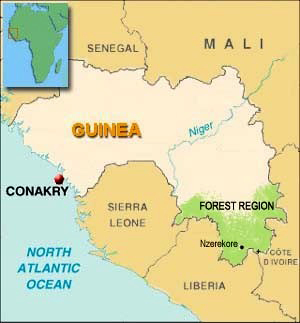"The latest wave is occurring because of poor sanitation during the main rainy season and a lack of potable water," said Emmanuel Roland Malano, who head's the government's division of epidemiological diseases.
He said 25 people have died in Conakry, including 19 who passed away at their homes.
Cholera is an acute bacterial intestinal infection that is transmitted through contaminated food and water. It has a short incubation period, from one day to five days, with the main symptom being diarrhoea that can quickly lead to severe dehydration and death if untreated.
Guinean health officials said they are warning the population against physical contact with people suspected of having contracted the illness. They specifically advise against contact with the bodies of those who have died from it.
In the remote Forest Region in the southeast, 13 people died of cholera in September in the town Kissidougou and another 20 died in the town of Lola, according to Mory Moussa Doukoure, a doctor at the laboratory in Conakry's Donka Hospital, Guinea’s main health facility.
In 2005, Guinea had 1,956 cases of cholera between mid-July and early September with 72 deaths, according to the World Health Organisation (WHO).
In addition to Guinea, cholera is on the rise elsewhere in Africa. Authorities in Chad have tallied 1,201 cases with 60 dead between June and October. The highest number occurred in the southwest in the Hadjer-Lamis region where authorities confirmed 558 cases with 28 dead.
Chad's minister of public health, Ngarmbatna Carmelle Sou IV, told reporters this week that Chadians needed to make a greater effort to protect themselves and their environment by more frequently using toilets and ensuring that their water supplies are protected.
Otherwise, Ngarmbatna said, "a cholera epidemic [will continue to] make its home in our country every wet season".
mc/dp/dh/cs
This article was produced by IRIN News while it was part of the United Nations Office for the Coordination of Humanitarian Affairs. Please send queries on copyright or liability to the UN. For more information: https://shop.un.org/rights-permissions





